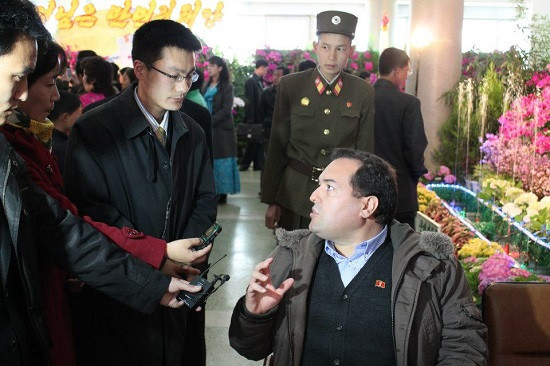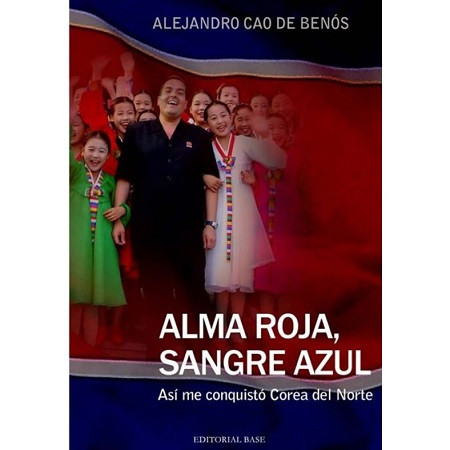Alejandro Cao de Benos: North Korea's Friend from the West

Torture, executions, rape and crimes against humanity: a UN dossier contained a litany of human rights abuses relating to North Korea and said its supreme leader Kim Jong-un could be tried at the International Criminal Court.
Defending North Korea puts you in the minority these days, but there is one man who stands by the pariah state. His name is Alejandro Cao de Benos and he is the special delegate of the DPRK's Committee for Cultural Relations with Foreign Countries and president of the Korean Friendship Association (KFA).
Cao de Benos has published his autobiography, Alma Roja, Sangre Azul (Red Soul, Blue Blood), and IBTimes UK spoke to him about what really goes in the world's most secretive of states.
How did you come up with the idea of writing your autobiography?
I wrote it because at conferences and interviews everyone wonders how it is possible that, being born in Tarragona, I am considered just another North Korean. As I can't summarise this question in five or 10 minutes, I wrote it down. Thanks to the encouragement of several friends, teachers and doctors, I found the time and the right publisher.
What attracted you most about North Korea?
You could say it grew out of a symbiosis, not only ideological, but from principle as well: honour, discipline and all these values that in the West are diluted by consumerism. This symbiosis was born in 1990 and my passion for this country kept growing. I created the country's first website and after that I was established as facilitating a bridge with other countries.
How much time do you spend in North Korea and how much in Spain?
Over four months in the DPRK, three months in Spain, and the rest in other countries, depending on where my presence is required.
Is it true that you work for free for the North Korea government?
Exactly. Until 2006 I had been an IT consultant, last time working for Cap Gemini Ernst & Young, developing the infrastructure and service for the Global Executive MBA in the IESE Business School. After that worked in international trade.

After so many years working for the North Korean government, have you managed to understand why the public has this very dark picture of the country?
Yes, due to a double problem. First, North Korea doesn´t care what others think and has never taken the time to explain things to the outside world. The country is concerned only about its internal development. And if it ever provides North Koreans information, it's normally Korean-style. That means literal translation, which is very difficult to understand for a Western mentality. This creates a huge lack of information that it is exploited to publish false and fabricated news.
Are you saying that the great majority of all the terrible news that often appears in the media about North Korea is pure propaganda?
The vast majority, I would say a 97/98%, of the news is totally false. Just take a look at the sources and you will see that in most cases they are anonymous sources, coincidentally, from outside North Korea.
So there is neither famine nor iron dictatorship then?
We had a problem of famine from 1995-2000, caused by three main factors. First, the arable land of the country is 20%, and with the disappearance of the socialist market we were left without any partner to trade with. Second, the United States imposed severe sanctions on North Korea and today we can't even make a transaction of €10 by bank transfer - a clear sign of asphyxiation from capitalism.
And finally the main problem of the country is that in winter temperatures reach -50C and we have to import what we need from capitalist countries. And who sets the price? The Chicago Stock Exchange. We're not in the IMF and World Bank so that the currency is not convertible. We must have all the facts before you start saying terrible things like most people do.
Have you ever met Kim Jong-un?
I had the chance to shake hands with him in October. I've had written communications with him several times.
What impression did he leave on you?
I'm struck with the idea of "continuity", which is the word used when King Jong-il succeeded our leader Kim Il-sung and currently marshal Kim Jong-un is doing exactly the same. We have a great continuity in our ideology and progress into the future now that the country is recovering very quickly and economically.
As mentioned before, North Korea appears constantly in the media, especially last December with the execution of Jang Song-thaek. Do you want to make any comment about it?
Yes. This is the first time that a situation like this was made public and that's because it's to be an example to politicians. Anyone who goes against the country will be punished.
I read on your blog that you are against the death penalty
Yes, personally I am against the death penalty because I believe that an execution solves nothing. That is my personal vision.
We published a story where one source at Amnesty International said that Jang Song-thaek was executed to reinforce Kim Jong-un's authority to the world. What do you think?
Amnesty International is an organisation that has not been in North Korea but always puts it as the first country in its Black Book. This is basically a propaganda agency paid by the CIA and major corporations. As an example we have a simple employee in the UK who is earning about €4,000 a month. You tell me how an NGO can afford that? Where does all that money comes from?

Alejandro Cao de Benos' Alma roja, sangre azul is available on http://amzn.to/MtxnsI
© Copyright IBTimes 2025. All rights reserved.




















